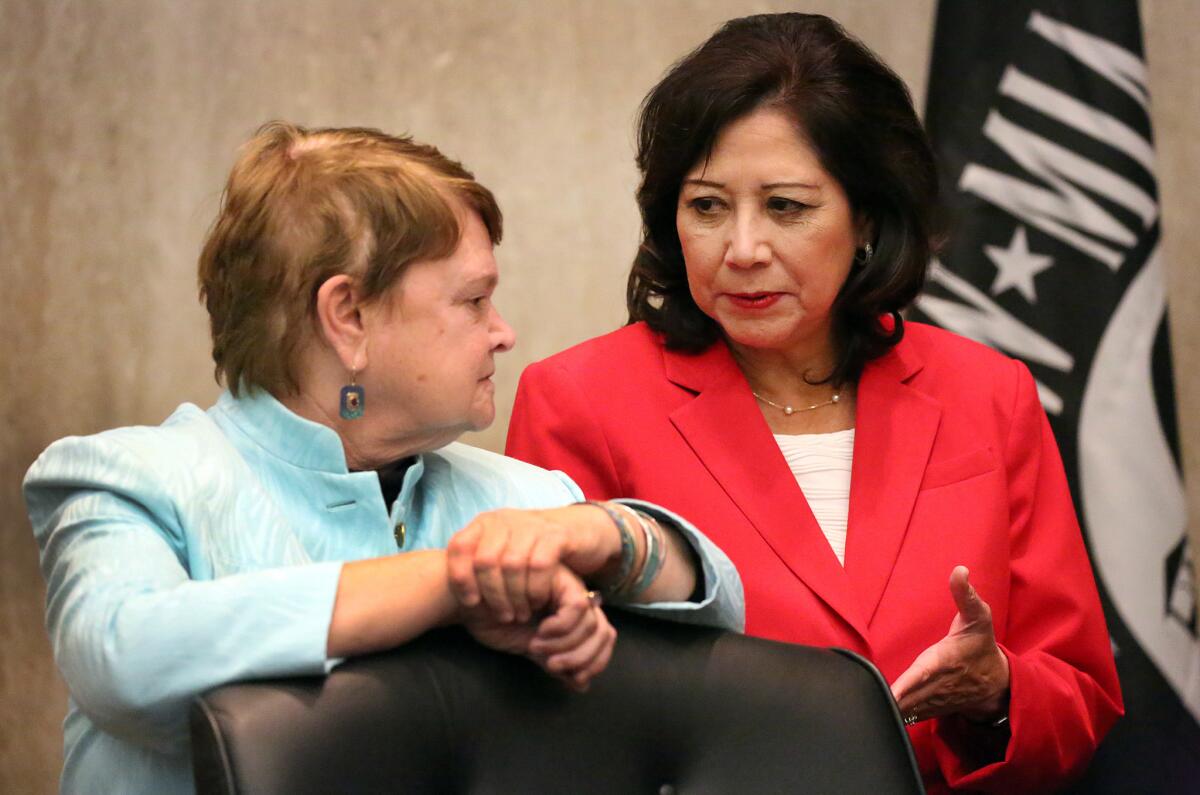Editorial: L.A. County is floating an irresponsible last-minute ballot measure. Again

- Share via
The nation is facing a racial reckoning, brought on in part by the COVID-19 pandemic and its disparate impact on people of color, and more directly by the killing of George Floyd and the ongoing protests against police brutality and structural racism. The events — together with the looming November election — open a window of opportunity to cement in place important changes not just to policing but to the policies, priorities and principles that govern American society.
It’s not clear how long that window will remain open, so it’s important to move quickly on the best and most carefully vetted ideas. One good example is the House police reform bill, which builds on more than a decade’s worth of focused debate as well as the actual experience of some forward-looking police departments.
It’s also important not to squander the opportunity by getting enmeshed in rushed, unexamined and seemingly spur-of-the-moment proposals that backers insist must be adopted right away with insufficient scrutiny or discussion.
Into that latter category falls a motion by the Los Angeles County Board of Supervisors, unveiled late Friday and due to be voted on Tuesday, to put a charter amendment on the November ballot to permanently designate minimum funding levels for social service programs.
It’s an ill-considered proposal, but credit to Supervisors Sheila Kuehl and Hilda Solis for at least picking the right programs and the right purpose. Mental health, affordable housing, youth support, small business assistance, job development — these are all crucial services that have gone unfunded or been defunded over the decades in favor of an expanding criminal justice, police and incarceration infrastructure.
Kuehl and Solis are correct when they argue in their motion that “a redistribution of resources is needed.”
But that’s their job as supervisors — to approve a budget each year that reflects a policy direction that in turn responds to the needs of their constituents. The county’s chief budget officer works for, is hired by and can be fired by the board, which has taken significant steps over the last several years to reallocate spending from law enforcement to alternatives to incarceration. If board members believe that the budget they approved just a few weeks ago still falls short — and it does — they have no one to blame but themselves.
Ballot-box budgeting of the sort the supervisors propose is a bad idea and poor substitute for careful study, deliberation and decision making.
Imagine how difficult it would be today if the board of 15 years ago had asked voters to alter the county charter to require that the bulk of each year’s budget go to jails. Such an amendment could well have passed — but it would have undermined the voters’ power and the supervisors’ ability to make decisions that are right for the time. The same is true of the board 15 years into the future. We can’t predict the county’s needs in 2035 and should not lock in its spending priorities today.
There’s an additional problem. This board has a habit of waiting until close to the deadline for submitting ballot measures and then popping out something that the public has not previously seen. That move has led in recent years to voters rejecting last-minute measures to pay for parks, clean water and emergency services. The defeated parks and water measures went back to the drawing board and then — this time with better public notice, outreach, discussion and vetting — passed.
Supervisors Mark Ridley-Thomas and Janice Hahn have a related matter on Tuesday’s agenda, calling for a review and analysis of the Kuehl-Solis charter amendment. It’s shocking to realize that such an analysis was not done before putting the charter measure on the agenda.
Ridley-Thomas has another motion due Tuesday that acknowledges the ugly role of racism in setting county priorities. The task of examining the role of race in, and eliminating racism from, county programs is a worthy and in fact essential undertaking that will require a serious analysis of data. Critics may complain that it is all talk and no action, but talk — and study, and data collection, and debate — precedes meaningful decision making.
Without that sort of open discussion, actions as consequential as putting a charter amendment on the ballot are precipitous. The supervisors, if they are wise, will scrap the charter proposal as rushed and ill-considered, and will recommit themselves to, and stand behind, responsible budgeting.
More to Read
A cure for the common opinion
Get thought-provoking perspectives with our weekly newsletter.
You may occasionally receive promotional content from the Los Angeles Times.









